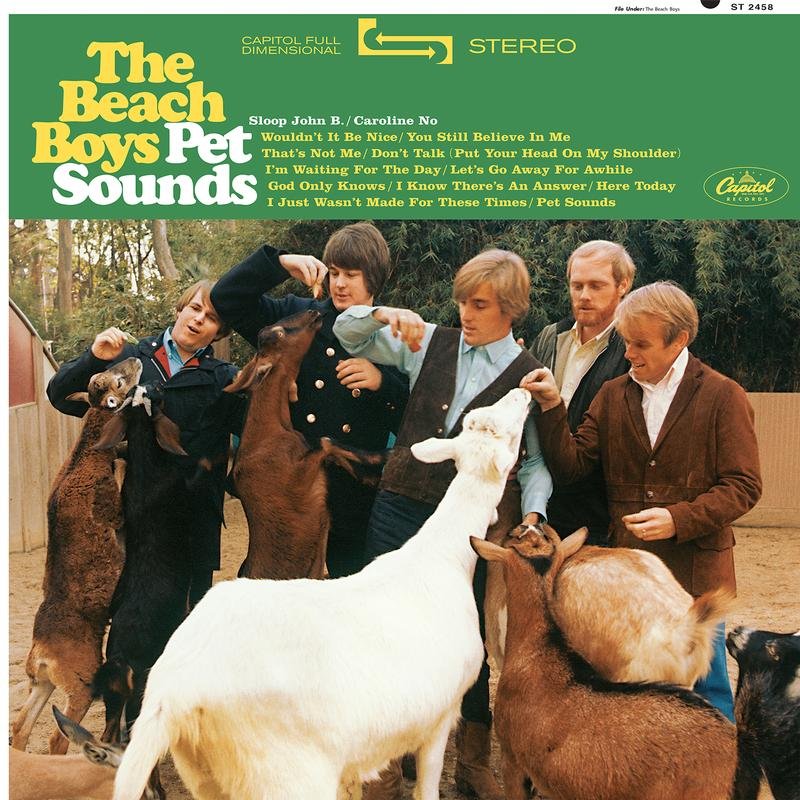Introduction
In the wake of Brian Wilson’s recent passing, the world mourns the loss of a musical icon whose profound influence on pop music continues to reverberate. As one of the greatest songwriters and producers in history, Wilson’s groundbreaking work with The Beach Boys, particularly the album Pet Sounds, redefined the very nature of popular music. This essay delves into his musical journey, the birth of Pet Sounds, and its unparalleled legacy, capturing the essence of Brian Wilson’s creative genius.
The Origins of The Beach Boys
The Beach Boys were formed in 1961 in Hawthorne, California, by brothers Brian, Dennis, and Carl Wilson, their cousin Mike Love, and friend Al Jardine. Their sound quickly became synonymous with the carefree, sunny vibes of the California lifestyle. Early hits like Surfin’ USA and Fun, Fun, Fun cemented their place in pop culture.
However, while these songs painted a picture of endless summer, it was Brian Wilson’s artistic vision that would elevate the group’s music to a new, groundbreaking level. As the lead songwriter and producer, Wilson became the creative force that would steer The Beach Boys toward more experimental and emotional territory.
Brian Wilson – The Visionary Force
In 1964, Wilson made the decision to stop touring with the band, which would prove to be a pivotal moment. Freed from the pressures of live performances, he could now pour his energy into the studio. He began crafting a sound that was more complex, more sophisticated than what had come before.
Inspired by The Beatles’ Rubber Soul, Wilson set out to create an album that would push the boundaries of pop music. The result was Pet Sounds, a record that would go on to redefine the idea of what a pop album could be.
The Making of Pet Sounds
With Pet Sounds, Wilson aimed to create a cohesive, emotionally resonant album rather than just a collection of songs. He enlisted the help of lyricist Tony Asher and a group of session musicians known as The Wrecking Crew to bring his ideas to life. The result was a lush, intricate sound that blended rock, pop, and classical elements in a way never before heard in popular music.
Notable tracks from the album include:
- “Wouldn’t It Be Nice”: A dreamlike expression of youthful longing, with shifting keys and intricate instrumentation.
- “God Only Knows”: A haunting love song considered one of the greatest of all time.
- “Caroline, No”: A poignant reflection on the loss of innocence, initially released as a Brian Wilson solo single.
Themes and Lyrics
Pet Sounds introduced a level of emotional depth that was unheard of in mainstream pop music at the time. The lyrics touched on themes of love, loss, insecurity, and personal growth. Wilson’s ability to delve into his own emotional struggles made the album relatable, connecting with audiences on a deeply personal level.
The album’s emotional core is evident in tracks like “I’m Waiting for the Day” and “I Just Wasn’t Made for These Times,” which captured Wilson’s feelings of alienation and internal conflict.
Reception and Legacy
When Pet Sounds was released in May 1966, it received critical acclaim but only moderate commercial success in the U.S. However, it found a more enthusiastic audience in the U.K., and its influence soon became undeniable. Paul McCartney famously cited Pet Sounds as the inspiration for Sgt. Pepper’s Lonely Hearts Club Band, calling “God Only Knows” “the greatest song ever written.”
Over the years, Pet Sounds gained recognition as one of the most important albums in the history of recorded music. It now consistently appears at the top of “best albums” lists, reaffirming its position as a timeless work of art.
Technical and Artistic Innovations
Pet Sounds was a pioneering work in terms of both production and arrangement. Brian Wilson’s use of unconventional instruments—like bicycle bells, Coke cans, and dog whistles—helped create a unique, layered sonic experience that was years ahead of its time.
Wilson’s meticulous attention to detail extended to the vocal harmonies as well. He spent countless hours perfecting the band’s vocals, ensuring each note was flawless. The result was a harmony-rich sound that was both emotionally deep and sonically complex.
Brian Wilson’s Personal Struggles
While Pet Sounds stands as one of Wilson’s greatest artistic achievements, its creation was not without personal cost. At the time, Wilson was grappling with anxiety, depression, and the early stages of mental illness. These struggles would continue to haunt him throughout his life, affecting both his personal relationships and his music.
Despite the toll his mental health took, Wilson’s work on Pet Sounds was a triumph of artistic expression, demonstrating the transformative power of music to channel personal pain into universal beauty.
The Influence of Pet Sounds
Pet Sounds has had an immeasurable influence on musicians across genres. Its complex arrangements and emotional depth can be heard in the work of everyone from The Beatles and Radiohead to indie bands like The Flaming Lips and Sufjan Stevens.
More than just a record, Pet Sounds helped shape the album format into a true artistic medium. It showed that pop albums could be cohesive, meaningful statements, not just collections of songs.
Critical Reassessment and Modern Reception
In the decades since its release, Pet Sounds has been reassessed as a landmark achievement in pop music. It has been inducted into the Grammy Hall of Fame and preserved in the National Recording Registry. The album continues to receive critical praise, with numerous reissues and box sets ensuring that each new generation can experience its magic.
Conclusion
Through its lush arrangements, poignant lyrics, and groundbreaking production, Pet Sounds remains one of the most important and beloved albums in the history of recorded music—a true icon of the 20th century. As we reflect on Brian Wilson’s passing, we not only mourn the loss of an artist but celebrate his extraordinary legacy. His music redefined the boundaries of pop music, and his innovations have inspired countless musicians. Wilson’s ability to channel his own struggles into masterpieces has created a timeless connection to his audience, ensuring his influence will continue to resonate for generations to come.


You have the gift of turning abstract thoughts into something tangible, allowing the reader to grasp concepts with clarity.